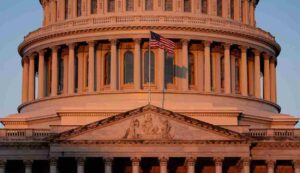State Healthcare Woes Put Pressure on Senate Republicans in Shutdown Battle
Senate Republicans healthcare 2025: The main source of contention in the government shutdown dispute, which reached its 13th day on Monday, is the expiry of health insurance subsidies, which a few Republicans in the U.S. Senate are grappling with.

Senate Democrats have proposed extending the subsidies, but the members have not voted in favor of it. Nonetheless, the senators are discussing a potential solution to the spike in health insurance rates with Democrats and the White House. Failing to fix the problem might become a disadvantage in the 2026 midterm elections, which will decide control of Congress, according to some Republicans.
Notices of steep premium hikes for plans purchased under the Affordable Care Act, or Obamacare, are starting to be sent to farmers, gig workers, and small company owners who do not have health insurance through their jobs.
According to insurance experts, middle-class Americans earning between $60,000 and about $105,000 a year are most at danger since they gained the most from the expanded subsidies initiated by Democrats during the COVID epidemic, and many of them reside in Republican strongholds.
At the end of the year, the additional subsidies come to an end.
The Republican senator for governor of Alabama, Tommy Tuberville, told reporters, “We have to make sure that premiums don’t go sky-high.”
Tuberville has openly expressed worries about the upcoming expiry, as have five other Senate Republicans: Lisa Murkowski, Josh Hawley, Susan Collins, Thom Tillis, and Jim Justice.
Senate Democrats used their power over a budget package that is necessary to maintain federal programs to start this confrontation in Washington. Republicans have a slim 53-47 majority in the Senate, and a temporary measure must get at least 60 votes to succeed.
In the absence of a healthcare agreement, Senate Minority Leader Chuck Schumer said that “people will go bankrupt, people will get sick, people will die.”
The Republicans’ short-term financing proposal has been rejected seven times by Democratic senators so far. Three Democrats have defected from the party and sided with Republicans, claiming that the short-term effects of the closure on Americans are too severe to wait for ACA talks.
SUPPORT FOR OBAMACARE ENROLLMENT IN REPUBLICAN STATES
According to a report by the healthcare group KFF, despite the fierce opposition Republicans in Congress had to Obamacare, enrollment in their states and districts has increased dramatically over the last five years since the enhanced subsidies were available.
Republican senators represent 12 of the 15 states where Obamacare membership has increased the quickest; over that period, enrollment has more than quadrupled in Texas, Mississippi, and Louisiana.
According to the data, 77% of Obamacare registrants nationally dwell in states that President Donald Trump won in 2024.
Alaska Republican Senator Murkowski told reporters that senators had “spitballed” options with their bipartisan colleagues.
Murkowski made fun of her fellow Republicans when asked whether she receives “any love” for her proposal to extend the ACA tax credit for two years in order to end the shutdown.
“We have to open the government first before I can talk to you,” she added, slipping into a low, dramatic voice that mimicked a male senator.
Trump suggested last week that a healthcare “deal” “could lead to very good things,” but he later retracted his statement that talks were possible.
Representative Marjorie Taylor Greene, a Republican from Georgia, whose membership has also quadrupled, recently defected from her party and accused the leadership of failing to give the healthcare issues top priority.
A group of House Republicans in competitive districts throughout the country are attempting to bridge the gap and are advocating for a one-year extension of subsidies as the 2026 midterm elections get closer.
Cameron Ellis, a health insurance specialist and professor of finance at the University of Iowa, said that “many current enrollees would cancel their plans if these subsidies expire and there is no other fix.” “The healthier people would drop coverage and this would raise the premiums for everyone in the ACA marketplace beyond the removal of the subsidy itself.”
On Capitol Hill, ACA politics and distress
This is the most recent development in a 15-year battle in which Republicans have attempted to repeal or severely damage Obamacare on the grounds that the government ought to stay out of the health insurance market.
Hardline Republicans who wanted to postpone or cut off funding for Obamacare were the ones who started the 2013 government shutdown.
Other Republicans have since persisted in pointing out Obamacare’s flaws, and this mistrust might jeopardize a future agreement.
Senator Rick Scott of Florida said, “We’ve got to fix Obamacare, which is causing prices to go up,” claiming the cost of the coverage is not worth the quality.
Vice President JD Vance advocated for deregulation and questioned several portions of the subsidy on Sunday.
The 2013 shutdown was resolved with a pledge to negotiate a bipartisan budget rather than reworking Obamacare.
Democrats said they don’t trust Republicans as much this time.
Senator Patty Murray, a Democrat from Washington, said, “We want to work with them now to get a vote on this,” as legislators departed town last week without reaching a consensus. “We know darn good and well that if we just throw our hands up in the air and say, ‘We’ll trust you later!’ the chances of it happening are not there.”